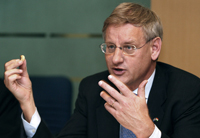EU urges Kosovo's new PM not to rush to independence

EU foreign ministers urged ex-rebel leader Hashim Thac – who likely will be the next premier of Kosovo – not to rush to independence from Serbia if talks fail to resolve Kosovo's future.
Javier Solana, the EU's foreign policy chief, said he hoped for progress during internationally brokered talks on the territory's status that resume Tuesday in Brussels.
"I hope that they will have some elements to construct upon," Solana told reporters as he arrived for the EU ministerial meeting.
Solana said the weekend elections in Kosovo had not changed the situation although Thaci threatened to swiftly declare Kosovo independent after a Dec. 10 deadline for the talks. Thaci, won Saturday's parliamentary elections, according to unofficial vote results.
Two years of negotiations between Kosovo's ethnic Albanian leaders and the Serbian government over the province's status have made little progress.
A new round, mediated by representatives from the United States, Russia and the EU, will be held in Brussels on Tuesday and another in the Austrian capital on Nov. 26.
After the last meeting in Vienna this month, both delegations suggested the December deadline for a compromise settlement may not be met.
"Kosovo should have her independence, it shouldn't be an unmanaged unilateral declaration it should be one that is coordinated by the international community," said Britain's European Affairs Minister Jim Murphy.
Swedish Foreign Minister Carl Bildt said: "I'm sure he (Thaci) understands there is a difference between a politician in opposition and a prime minister, we wish him to be a responsible prime minister.
"Kosovo is already de facto independent from Serbia. I don't think Kosovo wants to be independent from the international community."
Luxembourg Foreign Minister Jean Asselborn said a unilateral declaration by Kosovo without international backing would be "really, really bad" for Balkan stability.
"We are trying to do all we can to convince the Kosovars not to proceed with a unilateral declaration of independence," Asselborn said.
The EU ministers were to be briefed by the EU's envoy to the international talks on Kosovo, Wolfgang Ischinger, before Tuesday's status talks.
The province has been under U.N. control since 1999, when NATO intervened to stop a Serbian military crackdown against Albanian separatists.
Kosovo borders Albania, and ethnic Albanians are in the majority. NATO is currently in charge of Kosovo's security and keeps a 16,000-strong peacekeeping force in the province.
Subscribe to Pravda.Ru Telegram channel, Facebook, RSS!


